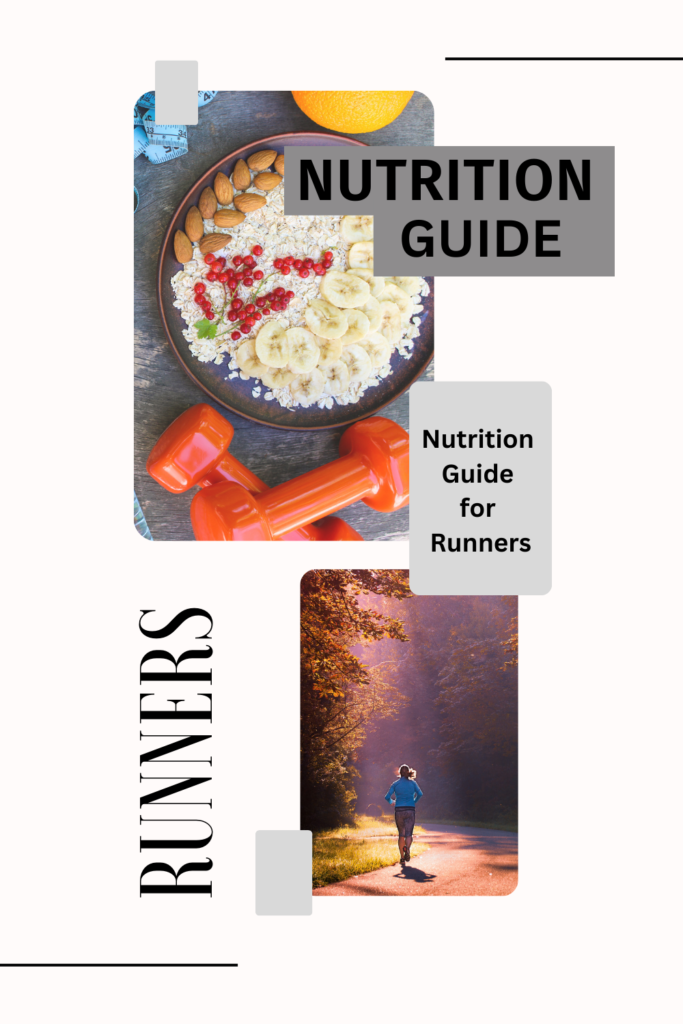Boost Your Running Performance: Nutrition Tips for Runners
Fueling Your Stride Towards Success
As runners, we understand that every stride we take is a step closer to our goals. Whether you’re pounding the pavement or conquering trails, the journey to peak performance involves more than just putting in the miles. Nutrition plays a pivotal role in unlocking your full running potential.
**Disclaimer:** The information provided in this blog post is for general informational purposes only and is not intended as professional advice. Before making any significant changes to your diet, exercise routine, or considering supplements, it is advisable to consult with a healthcare professional or a qualified nutritionist.

Hydration Matters
Running is a demanding endeavor, and adequate hydration is the cornerstone of peak performance. Before you hit the pavement, ensure you’re well-hydrated to optimize your body’s ability to tackle the miles ahead.
Pre-Run Hydration: Start your hydration journey well before lacing up. Aim to consume water consistently throughout the day leading up to your run. This primes your body for the upcoming exertion.
Electrolyte Balance: Maintain a proper electrolyte balance, especially on longer runs. Consider electrolyte-rich drinks or supplements to replenish sodium, potassium, and magnesium lost through sweat.
During-Run Hydration: For sustained runs, have a hydration strategy in place. Portable options like water bottles or hydration belts can keep you fueled on the go. Experiment to find what works best for you.
Fueling Before Runs
Preparing your body with the right fuel before a run can significantly impact your energy levels and performance. Consider your pre-run nutrition as the foundation for a successful outing.
Timing Matters: Consume a balanced meal or snack 1-2 hours before your run. This allows your body to digest and convert the nutrients into usable energy. Experiment with timing to find what works best for your digestive comfort.
Carbohydrates are Key: Prioritize complex carbohydrates for sustained energy. Options like whole grains, fruits, or energy bars can provide the necessary fuel without causing a spike in blood sugar.
Moderate Protein: Include a moderate amount of protein to support muscle function. Greek yogurt, nut butter, or a small serving of lean protein can be excellent choices.
Hydrate Smartly: Pair your pre-run meal with adequate hydration. This combination sets the stage for optimal performance and helps prevent dehydration during your run.
During-Run Nutrition
As the miles add up, it becomes crucial to sustain your energy levels during longer runs. Strategic during-run nutrition can be the key to maintaining peak performance throughout your journey.
Tailor to Your Duration: For shorter runs, you may not need additional fuel. However, for runs extending beyond an hour, consider incorporating easily digestible options to replenish glycogen stores and ward off fatigue.
Portable Fuel Options: Explore various portable fuel options such as energy gels, chews, or sports drinks. These provide a quick and accessible source of carbohydrates to keep you fueled on the go.
Hydration Integration: If your run extends beyond an hour, don’t forget the importance of hydration. Consider combining your fuel intake with sips of water to maintain a balance and support optimal performance.
Listen to Your Body: Everyone’s nutritional needs during a run are unique. Pay attention to how your body responds to different fueling strategies and adjust accordingly. Experiment during training runs to find what works best for you.
Post-Run Recovery
Congratulations on completing your run! Now, the focus shifts to a crucial phase: recovery. How you replenish your body in the aftermath of a run plays a vital role in your overall performance and well-being.
Rehydrate and Refuel: Start by replenishing lost fluids with water. Follow this up with a balanced post-run meal that includes both carbohydrates and protein. This combination aids in muscle glycogen replenishment and supports muscle recovery.
Quick Snack Options: For a speedy recovery, have a snack ready with a 3:1 or 4:1 ratio of carbohydrates to protein. This could be a banana with nut butter, a yogurt parfait, or a protein smoothie.
Stretch and Cool Down: Allocate time for a proper cool-down routine. Stretching can help improve flexibility, reduce muscle soreness, and enhance recovery. Focus on major muscle groups used during your run.
Consider Compression Gear: Some runners find benefit in using compression gear post-run. Compression gear may help reduce muscle soreness and improve circulation, aiding in a quicker recovery.
Nutrient-Rich Foods for Runners
Fueling your body with nutrient-dense foods is a fundamental aspect of supporting your running endeavors. These foods provide the vitamins, minerals, and antioxidants your body needs for optimal performance and recovery.
Essential Nutrient-Rich Options:
Leafy Greens: Incorporate dark, leafy greens such as kale or spinach into your meals. Packed with vitamins like A, C, and K, these greens contribute to overall health and aid in muscle recovery.
Berries: Rich in antioxidants, berries like blueberries and strawberries combat oxidative stress induced by running. Add them to your post-run meals or snacks for a flavorful and nutritious boost.
Lean Proteins: Include lean protein sources like chicken, turkey, tofu, or legumes. Protein is essential for muscle repair and growth, crucial aspects of post-run recovery.
Whole Grains: Opt for whole grains such as quinoa, brown rice, or oats. These grains provide complex carbohydrates, offering sustained energy and aiding in glycogen replenishment.
Healthy Fats: Incorporate sources of healthy fats like avocados, nuts, and olive oil. These fats support joint health, an important consideration for runners, and contribute to overall well-being.
Greek Yogurt: A versatile dairy option, Greek yogurt combines protein and carbohydrates, making it an excellent choice for post-run recovery. Add fruits or nuts for added flavor and nutrients.
By diversifying your diet with nutrient-rich foods, you not only enhance your running performance but also promote overall health. In the next section, we’ll touch on the role of supplements and whether they have a place in your running journey. Let’s continue to nourish both body and goals!
Supplements for Runners
While a well-balanced diet should be the primary source of nutrients, some runners may consider supplements to fill potential gaps or address specific needs. It’s important to approach supplements with caution and, if in doubt, consult with a healthcare professional.
Considerations for Supplements:
Vitamin D: Especially important if you have limited sun exposure, vitamin D is crucial for bone health. Consider a supplement if your levels are deficient, but aim to get some sunlight when possible.
Omega-3 Fatty Acids: These essential fats support heart health and may have anti-inflammatory effects. If your diet lacks fatty fish, flaxseeds, or chia seeds, a fish oil or algae-based omega-3 supplement could be considered.
Iron: Long-distance runners, especially females, may be at risk of iron deficiency. Consult with a healthcare professional to determine if iron supplementation is necessary based on your individual needs.
B Vitamins: Runners with a high training volume may benefit from B vitamin supplementation. B vitamins play a role in energy metabolism. However, it’s preferable to obtain these from a varied diet.
Electrolyte Supplements: If you engage in intense or prolonged exercise, electrolyte supplements can help maintain balance. These are particularly relevant if you’re running in hot conditions and sweating heavily.
Remember, supplements should complement a solid nutritional foundation, not replace it.
Personalized Nutrition Plans
Creating Your Personalized Nutrition Plan:
Assess Your Goals: Define your running goals, whether it’s improving speed, endurance, or overall health. Your nutrition plan should align with these objectives.
Consider Dietary Preferences: Craft a plan that suits your dietary preferences and restrictions. Whether you’re a vegetarian, vegan, or have specific allergies, there are ways to tailor your nutrition accordingly.
Understand Your Body: Pay attention to how your body responds to different foods. Experiment with timing, ratios, and types of nutrients during training to find what optimally fuels your performance.
Consult with a Nutrition Professional: For a truly personalized approach, consider consulting with a nutrition professional. They can assess your unique needs, create a customized plan, and provide ongoing support.
Adapt and Refine: Your nutrition needs may change with training intensity, duration, and personal circumstances. Regularly assess and adjust your plan to accommodate these changes for continued success.
Remember, the best nutrition plan is the one that works for you. It’s not a one-size-fits-all approach.
Fueling Your Running Success
Remember, your running journey is unique, and so should be your approach to nutrition. It’s not just about the miles you conquer but the mindful steps you take to fuel your body for success. Whether you’re a seasoned marathoner, or a beginner finding your stride, the principles of smart nutrition remain a constant companion on the road to achievement.
Happy running!
Ask a Coach HERE
More Running Resources HERE
Pinterest HERE




